Notes
Related Research Articles

The Allman Brothers Band were an American rock band formed in Jacksonville, Florida in 1969 by brothers Duane Allman and Gregg Allman, as well as Dickey Betts, Berry Oakley, Butch Trucks (drums), and Jai Johanny "Jaimoe" Johanson (drums). Subsequently, based in Macon, Georgia, the band incorporated elements of blues, jazz, and country music, and their live shows featured jam band-style improvisation and instrumentals.
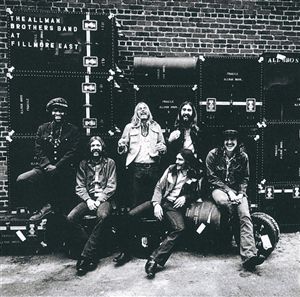
At Fillmore East is the first live album by American rock band the Allman Brothers Band, and their third release overall. Produced by Tom Dowd, the album was released in July 6, 1971, in the United States by Capricorn Records. As the title indicates, the recording took place at the New York City music venue Fillmore East, which was run by concert promoter Bill Graham. It was recorded over the course of three nights in March 1971 and features the band performing extended jam versions of songs such as "Whipping Post", "You Don't Love Me" and "In Memory of Elizabeth Reed." When first commercially released, it was issued as a double LP with just seven songs across four vinyl sides.

Eat a Peach is a 1972 double album by American rock band the Allman Brothers Band, containing a mix of live and studio recordings. Following their artistic and commercial breakthrough with the release of the live album At Fillmore East (1971), the Allman Brothers Band got to work on their third studio album. Many in the band were struggling, however, with heroin addictions, and checked into rehab to confront these problems. On October 29, 1971, group leader and founder Duane Allman was killed in a motorcycle accident in the band's hometown of Macon, Georgia, making it the final album to feature the guitarist. Produced by Tom Dowd, the album was released on February 12, 1972, in the United States by Capricorn Records. It was the band's fourth album since their debut The Allman Brothers Band in 1969, and is their third studio album and second live album.

Gregory LeNoir Allman was an American musician, singer and songwriter. He was known for performing in the Allman Brothers Band. Allman grew up with an interest in rhythm and blues music, and the Allman Brothers Band fused it with rock music, jazz, and country at times. He wrote several of the band's biggest songs, including "Whipping Post", "Melissa", and "Midnight Rider". Allman also had a successful solo career, releasing seven studio albums. He was born and spent much of his childhood in Nashville, Tennessee, before relocating to Daytona Beach, Florida and then Richmond Hill, Georgia.
"Little Martha" was the only Allman Brothers Band track written solely by group leader and partial namesake Duane Allman. The song first appeared as the final studio track on the Allman Brothers Band's fourth album, Eat a Peach, released in 1972. The track was recorded in October 1971, a few weeks before Duane Allman's death in a motorcycle accident.

"Melissa" is a song by American rock band the Allman Brothers Band, released in August 1972 as the second single from the group's fourth album, Eat a Peach. The song was written by vocalist Gregg Allman in 1967, well before the founding of the group. Two demo versions from those years exist, including a version cut by the 31st of February, a band that featured Butch Trucks, the Allman Brothers' later drummer. Allman sold the publishing rights later that year, but they were reacquired by manager Phil Walden in 1972.

Forrest Richard Betts is an American guitarist, singer, songwriter, and composer best known as a founding member of The Allman Brothers Band.
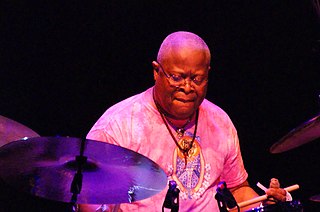
Jai Johanny Johanson, frequently known by the stage name Jaimoe, is an American drummer and percussionist. He is best known as one of the founding members of The Allman Brothers Band.

Brothers and Sisters is the fourth studio album by American rock band The Allman Brothers Band. Co-produced by Johnny Sandlin and the band, the album was released in August 1973 in the United States by Capricorn Records. Following the death of group leader Duane Allman in 1971, the Allman Brothers Band released Eat a Peach (1972), a hybrid studio/live album that became their biggest yet. Afterwards, the group purchased a farm in Juliette, Georgia, to become a "group hangout". However, bassist Berry Oakley was visibly suffering from the death of Duane: he excessively drank and consumed drugs. After nearly a year of severe depression, Oakley was killed in a motorcycle accident not dissimilar from his friend's in November 1972 making it the last album to feature Oakley.
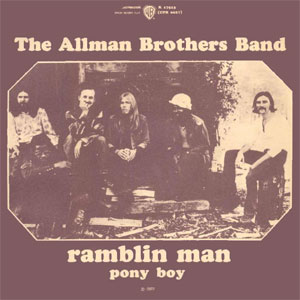
"Ramblin' Man" is a song by American rock band The Allman Brothers Band, released in August 1973 as the lead single from the group's fourth studio album, Brothers and Sisters (1973). Written and sung by guitarist Dickey Betts, the song was inspired by a 1951 song of the same name by Hank Williams. It is considerably more inspired by country music than other Allman Brothers Band compositions, which made the group reluctant to record it. Guitarist Les Dudek provides guitar harmonies, and it was one of bassist Berry Oakley's last contributions to the band.

Hittin' the Note is the twelfth and final studio album by the American Southern rock group the Allman Brothers Band. Released through Sanctuary Records, it is their only studio album to include both slide guitar player Derek Trucks and bass player Oteil Burbridge and marks the full-time return of guitar player Warren Haynes to the band. It was also their only studio album not to include original guitarist Dickey Betts.

A Decade of Hits 1969–1979 is a compilation album of the Allman Brothers Band, released in 1991. The album features songs released on The Allman Brothers Band, Idlewild South, At Fillmore East, Eat a Peach, Brothers and Sisters, and Enlightened Rogues. It is the band's best-selling album in the U.S., being certified double platinum by the RIAA in 1997.

The Road Goes On Forever was The Allman Brothers Band's first compilation album, a two-LP set released in 1975. It featured songs from the Allmans' first five albums. In 2001, an expanded edition was released featuring 13 more tracks. The album's title is a line from "Midnight Rider."
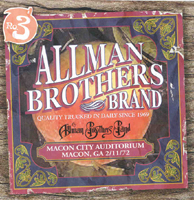
Macon City Auditorium: Macon, GA 2/11/72 is a two-CD live album by the Allman Brothers Band. It was recorded at the Macon City Auditorium in Macon, Georgia on February 11, 1972. The third archival concert album from the Allman Brothers Band Recording Company, it was released in 2004.

Gold is a two-CD compilation album by the Allman Brothers Band. It contains songs selected from their first eight albums, which were released by Capricorn Records — The Allman Brothers Band (1969), Idlewild South (1970), At Fillmore East (1971), Eat a Peach (1972), Brothers and Sisters (1973), Win, Lose or Draw (1975), Wipe the Windows, Check the Oil, Dollar Gas (1976), and Enlightened Rogues (1979). It was released by Island Records on October 11, 2005. It is a reissue of the 2001 expanded compilation The Road Goes On Forever: A Collection of Their Greatest Recordings.

Seven Turns is an album by the Allman Brothers Band, released in 1990. Their first studio album since Brothers of the Road in 1981, it was well-received, and peaked at #53. Hit singles were "Good Clean Fun" ; "Seven Turns" (#12) and "It Ain't Over Yet" (#26).

"One Way Out" is a blues song first recorded and released in the early-mid-1960s by Sonny Boy Williamson II and Elmore James, an R&B hit under a different name for G.L. Crockett in the mid-1960s, and then popularized to rock audiences in the early 1970s and onward by The Allman Brothers Band.
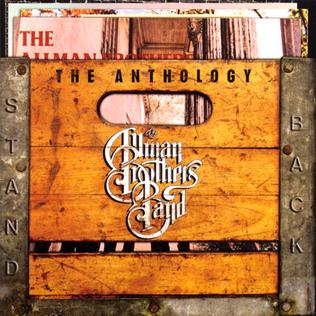
Stand Back: The Anthology is a compilation album by the Allman Brothers Band, released in 2004. It is the only retrospective which is cross-licensed among the different record labels for all of the band's studio recordings from its debut in 1969 through 2003.
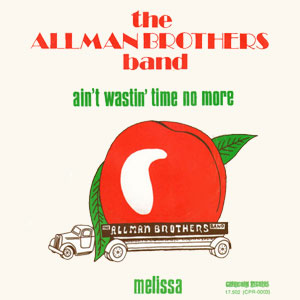
"Ain't Wastin' Time No More" is a song by the American rock band the Allman Brothers Band. It was the lead single from their third studio album, Eat a Peach (1972), released on Capricorn Records. The song, written by Gregg Allman, largely concerns the death of his brother, Duane Allman, who was killed in a motorcycle crash in 1971.
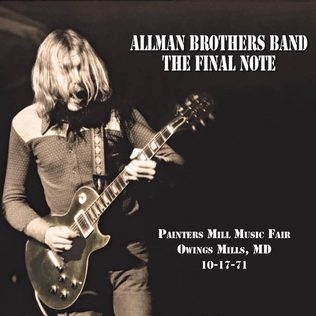
The Final Note is a live album by the Allman Brothers Band. It was recorded on October 17, 1971 at the Painters Mill Music Fair in Owings Mills, Maryland. It was released on October 16, 2020.
References
- ↑ VanHoose, Joe (June 3, 2009). "The 10 songs that define the sound of Southern rock". Ocala StarBanner . Retrieved November 22, 2020.
- ↑ Wolff, Kurt (2000). Country Music: The Rough Guide. Rough Guides. p. 410. ISBN 978-1-85828-534-4.
- 1 2 Paul 2014, p. 144.
- ↑ Paul 2014, p. 181.
- ↑ Paul 2014, p. 170.
Sources
- Paul, Alan (2014). One Way Out: The Inside History of the Allman Brothers Band. St. Martin's Press. ISBN 978-1250040497.
- Freeman, Scott (1996). Midnight Riders: The Story of the Allman Brothers Band. Little, Brown and Company. ISBN 978-0316294522.
- Allman, Gregg; Light, Alan (2012). My Cross to Bear . William Morrow. ISBN 978-0062112033.